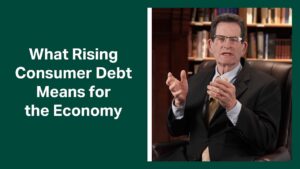As I sit down to write this blog post, I can’t help but reflect on the recent development that has caught the attention of many individuals – the resumption of student loan repayments. Being someone who has personally experienced the weight of student debt, I understand the impact it can have on one’s financial well-being. In this post, I will delve into the potential consequences of this resumption on consumer spending and its broader implications. Join me as I explore the effects that this policy change might have on individuals and the economy as a whole.
Introduction:
As an avid observer of the financial market, I would like to share my perspective on the resumption of student loan repayments and its potential impact on consumer spending. This topic has garnered significant attention as many individuals have concerns about its effect on the economy. However, I believe that the resumption of student loan repayments is unlikely to seriously derail consumer spending for several reasons.
Student loans make up a small portion of consumer debt:
One important point to consider is that student loans constitute only a fraction of overall consumer debt. While they can be a substantial burden for individuals, in the larger context of the economy, student loans do not hold significant weight. Mortgages, credit card debt, and auto loans collectively make up a much larger portion of consumer debt. Therefore, any impact caused by the resumption of student loan repayments would be limited in its scope.
Many students had time to plan for the resumption of repayments:
It is worth noting that the resumption of student loan repayments did not occur without warning. Students were aware that their grace periods would eventually end, and they had an opportunity to plan accordingly. Many individuals have already begun repaying their loans voluntarily, aware of the eventual need to do so. Therefore, it is unlikely that the sudden resumption of repayments will catch borrowers off guard or cause severe disruptions to their financial situations.
Consumer spending is not the sole driver of the economy:
While consumer spending plays a crucial role in driving economic growth, it is only one component of the larger equation. Capital investment and government spending also contribute significantly to the overall health of the economy. Consumer spending does not operate in a vacuum; rather, it exists in a complex interplay with various factors. Therefore, even if some individuals reduce their spending due to student loan repayments, other economic drivers can help offset any potential negative impact.
Conclusion:
In conclusion, the resumption of student loan repayments is unlikely to have a significant negative impact on consumer spending and the economy as a whole. Student loans exist as a smaller portion of consumer debt, individuals have had time to prepare for repayments, and consumer spending is not the sole determinant of economic growth. It is essential to recognize the broader context and various contributing factors that shape the economy.
Please note that the above views are my personal opinion and should not be considered financial advice. Investing in securities carries risks, and past performance is not indicative of future returns. If you would like more insights on the markets, you can find us on Facebook, Twitter, LinkedIn, and Instagram. Additionally, feel free to follow me on Facebook, Twitter, LinkedIn, Instagram, and TikTok.
Invest in securities involves risk of loss, and past performance is not a guarantee of future returns. Investing in foreign stock markets carries additional risks, such as currency fluctuations.
I hope this article provides a comprehensive understanding of how the resumption of student loan repayments may impact consumer spending.






